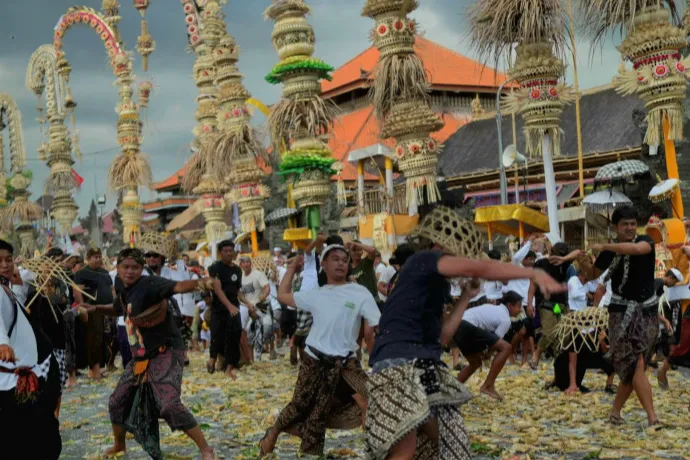
The Siat Tipat Tradition in Kapal Village, Badung: Cultural Heritage and Philosophical Values
Desa Adat Kapal
2025/10/6
42
The Siat Tipat Tradition in Kapal Village, Badung
History and Origins
The Siat Tipat tradition is one of the unique cultural heritages found in Kapal Village, Mengwi District, Badung. The word “siat” means war or battle, while “tipat” refers to ketupat, a rice cake wrapped in young coconut leaves. This “ketupat battle” is not carried out in hostility but rather symbolizes brotherhood, fertility, and gratitude of the community to God.
This tradition is usually held after the celebration of Kuningan Day, coinciding with the Aci Rah Pengenteg Jagat ceremony at Pura Desa Kapal.
Ritual Procession
The Siat Tipat ritual begins with a communal prayer at the temple as an expression of devotion to Ida Sang Hyang Widhi Wasa (God Almighty). Afterward, villagers gather in an open space or designated area, bringing hundreds of tipat. These ketupats are then playfully thrown at each other in a joyful and festive atmosphere.
Although it is called a “battle,” this tradition never sparks hostility. On the contrary, Siat Tipat serves as a medium to strengthen unity and foster togetherness among the community.
Philosophical Meaning
This tradition carries profound messages for the Balinese people, including:
-
Symbol of fertility and prosperity, as tipat is made of rice, representing well-being.
-
Expression of gratitude, for the blessings given by God.
-
Social harmony, as the ketupat battle is carried out joyfully without hatred.
-
Cultural preservation, as part of the identity of Kapal Village.
Cultural Tourism Attraction
Today, the Siat Tipat Tradition is not only a religious ritual but also a cultural tourism attraction in Badung. Visitors can witness firsthand how the Balinese preserve this unique tradition while experiencing the warm atmosphere of community togetherness.
This tradition is living proof that Bali is not only about beaches and nature but is also rich in cultural values that teach unity, tolerance, and reverence for ancestors.